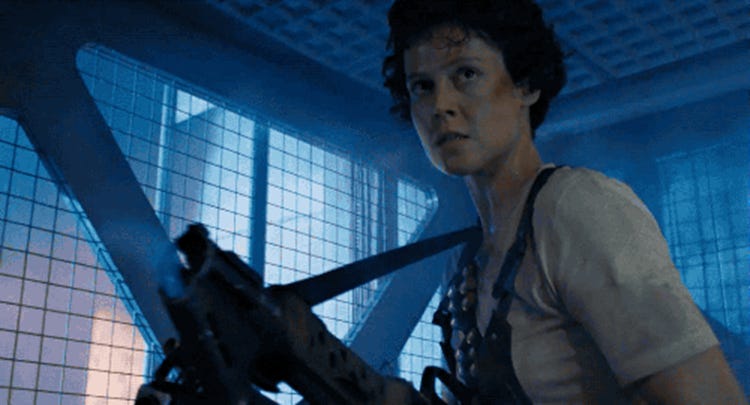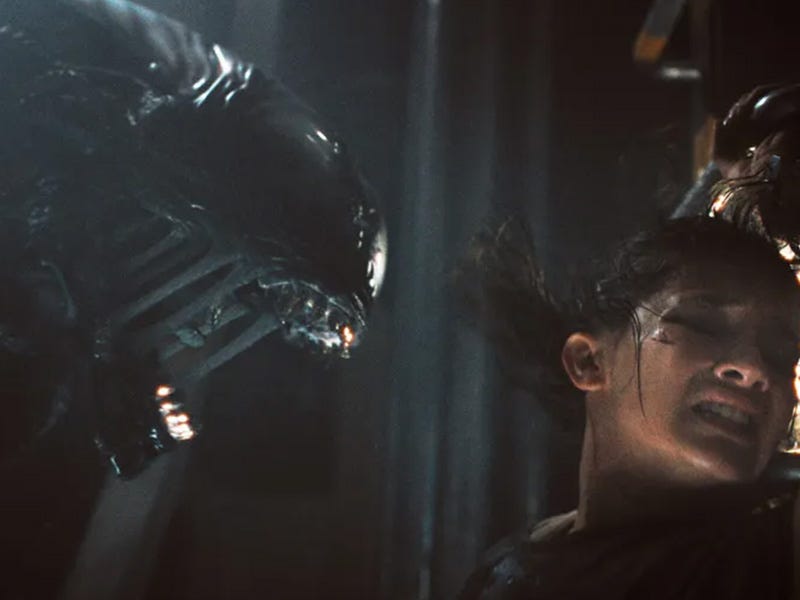Alien: Romulus
Blow the facehugger to smithereens with your motion-tracking pulse rifle.
I came into Alien: Romulus (2024) with high expectations.
As a kid, I grew up on the Alien franchise. Other kids grew up watching Marvel and DC films.
I grew up on Aliens.
The second film was my favorite, of course. How could it not be? I watched it a million times. We had an Aliens arcade machine in our basement. It was an amazing side-scrolling shooter (like Contra) with co-op play.
Of course, Sigourney Weaver was fantastic in the film. But so were Michael Biehn and Paul Reiser and Bill Paxton.
“That's it, man. Game over, man. Game over!”

Over the past decade or so, I missed a few entries in the franchise, including Prometheus and Alien: Covenant. Nevertheless, I had a student or two speak highly of Romulus, and so my father-in-law and I decided to give it a watch.
A Taste of What You’ll Find
The trouble with any sequel or addition to a franchise is how to maintain sameness while navigating difference. Too much like the other films in the franchise and fans will go, “Been there, done that.” Too different and people will go, “This isn’t the Alien I know and love.” But Romulus does a fantastic job balancing sameness and difference.1
The film follows Rain, an orphaned miner on a space colony, Andy (an android programmed by her deceased to take care of her), and Rain’s friends.
Rain and her friends are trying to escape an exploitative mining colony. Luckily for them, there’s a spaceship floating in orbit with some cryo pods they can use to freeze themselves for hypersleep. They need these pods for space travel to a more hospitable planet.
As you can imagine, the spaceship (consisting of two parts, one named Romulus and the other Remus) is infested with aliens. Absolutely infested. Rain and her friends don’t know this, but we do. What follows is a series of unfortunate events for Rain and her friends.
Mostly it is unfortunate for her friends.
The film is very pleasing on the aesthetic level, with many allusions to previous movies in the franchise. There’s Rain standing with gun in hand as wind blows through her hair as a low-angle camera pushes in (a la Ripley in Aliens).


Andy repeats Ripley’s famous one-liner: “Get away from her you b****!” You’ll hear scanners beeping and bopping, screen monitors typing text out with nobody sitting at the console, and of course, all the eerie harmonizing that you could ever desire. The color red also features prominently (a nice contrast to the yellowish green of Alien and hazy blue of Aliens).
Why I Like This Film (and the Alien Franchise)
It’s simple. Bad is bad, and you know it is bad.2
Sure, the film is gory and incredibly violent.3 But there is no sympathizing with the aliens. Got that? You don’t think: “Hey, I really feel for this poor creature just trying to make it in space. It is just misunderstood.” The alien is just a raw brute force of nature that will tear your face off in a heartbeat and enjoy it (it tends to savor closing in on its prey while it sticks out its mouth within a mouth and drools on your eyebrow).
There’s no sympathizing with the Weyland Yutani. No. The corporation is greedy and exploitative.
To hell with them both, man. Blow the facehugger to smithereens with your motion-tracking pulse rifle. Crush it with your foot. Freeze it, burn it, shoot it out the airlock into deep space.
The appetite to absolutely demolish the creature is palpable.
The demarcation of good and bad, especially in Romulus, is clear. We’re not invited to intellectualize, per se. There is no moral agnosticism at play, and honestly, I think that is just a freaking relief for an audience that is tortured by equivocations and moral relativism at every turn of their postmodern existence.
In fact, horror is such a potent genre perhaps for this very reason: We’re allowed to take a stand, to leave the grey zone of moral ambiguity, and to thrust our lance into the monster menacing us.
I still love the Alien franchise, and I enjoyed Romulus. Sure, you can look into the philosophy of motherhood at play within the films. There’s definitely something to be said about the theme of the parasite, too.4 But I’d watch it (and encourage you to do the same) if only because it enlivens the moral imagination.
Sure, you’re never going to see one of these aliens. But they are obviously a very potent metaphor for that dimension of your life that is going to consume you if you don’t confront it, quickly, with a pulse rifle.
Title: Alien: Romulus
Director: Fede Alvarez
Grade: 4.5/5
Genre: Sci-fi horror
The Moral Dimension: Violence, gore, language; viewer discretion advised
As a film that notably violated this rule, see the sequel to Gladiator, a sequel so devastatingly bad that I turned it off less than a half hour in. This Filmento review of Romulus does a fine job explaining how the limitations introduced into Romulus really took it to another level, even though the film has many of the same beats as the previous film(s).
It’s been a while, honestly, since I’ve watched the Alien films. Alien: Resurrection may invite our sympathy for a monster clone, if I recall correctly. But at least Alien and Aliens tell it to us straight: The creature is bad. Note also that other horror films (perhaps most) have a clear bad guy. But I don’t suppose this is always the case (or always must be the case).
Spoiler: There’s a rather disturbing childbirth scene in Romulus. If you’re pregnant, or if your wife is pregnant, you may want to sit this one out.
The word parasite comes from the Greek parasitos, which means “one who lives at another's expense, person who eats at the table of another.” The alien is a parasite, of course. It needs a host to grow on and burst out of. Weyland Yutani is also a parasite. It lives off the backs of the miners who do all the real work. The story of Romulus and Remus, too, can also be read as a parable of the twin as parasite, the one who feeds from the same table (i.e., the mother).




Great review. Enjoyed the movie and watching it with you!
Now I want to watch it!